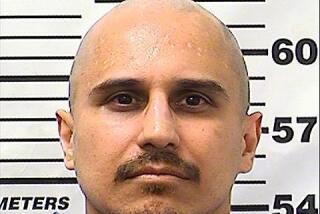Merced Police Aide Earns Minorities’ Trust : Service: Community representative’s success is based on having an open ear and giving honest answers.
- Share via
MERCED — Told by friends that he could face the death penalty, a packinghouse worker sought in the hit-and-run death of childhood kidnap victim Steven Stayner panicked and fled to his native Mexico.
It was only after semi-retired community aide Augie Provencio explained the charges and the possible penalties that Anthony Loera voluntarily returned to face the charges.
“I picked him up myself. I didn’t let him down; I didn’t betray him. When he got here, I worked with him, I worked with the courts,” Provencio said.
“This man, right now, thinks I walk on water.”
Like many with whom Provencio has worked during his 18 years as the Merced Police Department’s community aide, Loera was unfamiliar with both the law and the language of his newly adopted home and distrustful of authorities.
“They do not trust the Police Department. Before the amnesty program, there was a lot of abuse,” Provencio said.
He recalls a farm worker who was stopped at random and asked to show his green card.
“He shows them a mutilated green card. They say, ‘It’s not yours, it’s mutilated.’ And they throw him in jail for five days,” Provencio said.
The card, however, was current and it did belong to the worker.
“It was an abuse,” Provencio said. “People don’t forget times of abuse. It takes this generation coming to forget a lot of the open wounds.”
Perhaps it will be Provencio’s work that heals some of those wounds in the Central California city 120 miles southeast of San Francisco where more than half of the 53,000 residents are minorities.
Provencio’s tonic: an open ear and honest answers.
“People want somebody to talk to when they have a problem,” he said. “When you have a language barrier, it’s worse.
“The policeman has a job to do, investigate and arrest. I’m in the middle, working the police and the community at the same time. I do it well because they trust me. I don’t lie to them.”
When townspeople heard of Stayner’s death, sympathies went out to his family who had already suffered a great loss during the seven years their child was a kidnap victim during the 1970s.
It was rumored that Loera had been drinking when his car pulled in front of Stayner’s motorcycle, and it was not yet clear that the car had stalled.
Loera, aware that Stayner’s ordeal had been made into a television movie last spring, thought he had killed a movie star.
“The man ran. He was scared. He was confused,” Provencio said. “Here’s a man who had nothing to win by coming back.”
But he did come back, and, in many ways, he did win.
The district attorney dropped a charge of manslaughter and several traffic violations after an investigation found that engine problems in the car Loera was driving had caused the Sept. 16 accident. He still faces a charge of felony hit-and-run driving.
The Stayner case may be the most publicized of those that have passed over Provencio’s desk, but the circumstances are typical.
More than 90% of his cases are police-related, and he most often works with members of the Latino community, many of whom do not speak English and are usually illegal aliens.
But Provencio’s ties with the community also are highly personal. He helps families work through the bureaucracy to get a relative’s body returned to Mexico for burial, and parents come to him for advice on how to discipline their children.
“A mother comes to me with young kids and says, ‘I can’t control my 8-year-old.’ I help them control that family,” Provencio said.
“I have one family that I set all the rules in the house. I say when they go out, when they come in. They call me and ask, ‘Can I go to the show tonight?’ ”
Provencio said he has one rule when he helps people: They must do it his way.
“Being in control comes with the job I’m doing. I’m going to help you, but we’re going to do it my way because I know how to do it,” he said. “In other words, if you know better, then take it away.”
More to Read
Sign up for Essential California
The most important California stories and recommendations in your inbox every morning.
You may occasionally receive promotional content from the Los Angeles Times.










